"molly represented the neutral republic of ireland. in her spare time she wrote musicals."
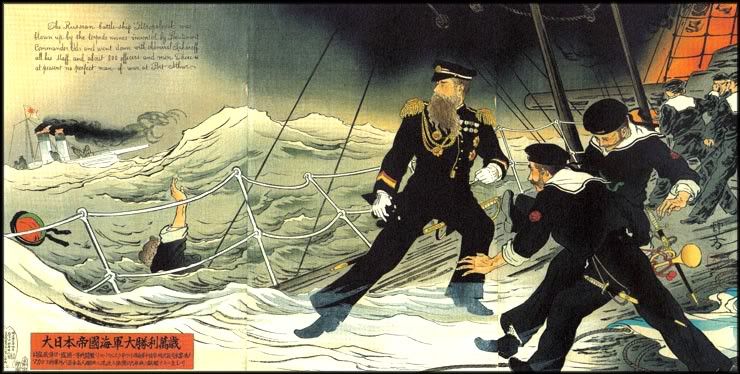
When I go out, in my abroad-life, I never come home immediately after whatever I do on that particular evening, and oftentimes I'm not back in my flat until several hours after the night's official activity has concluded. I enjoy this.
I've been doing alot of walking in the past few days, and alot of other random things, but keeping busy mostly, though not at all with the things with which I ought to be being busily kept (studying, cleaning, so-forth). An afternoon trip to pick up some notes at school, a few days ago, turned into a 5 hour walk across the city, and the heavy exploration of the lesser-known sections of campus, particularly the School of Philosophy (see here). The School of Philosophy is wildly beautiful and I appreciate it in itself, but I'm here to study (and far prefer) Journalism, damnit.
(That is a parable.)
I've been thinking alot about philosophy lately. My father has taken a sudden liking to St. Thomas Aquinas, with whom I'm not overwhelmingly familiar, but whom I'm loathe to embrace keeping in mind how fond the Opus people were of him in my classes last year (an indication that he likely would not mesh comfortably with my own views). In contrast, I've been looking into José Ortega y Gasset, who I studied [for the Selectividad] last year, and of whom I'm extremely fond. He studied and later taught at the UCM, and he is credited with having created the concept of racio-vitalism, which is fairly fascinating, and argued that the actions of man are not so much a product of biology, but rather a result of history. He was also huge on the individual, but one-uped Descartes by arguing that, yes, "To live is to live ourselves, to feel ourselves living, to know ourselves existing", but also challenging that there was more to this, that "cogito ergo sum" was incomplete as man may be because he thinks, but in being he also exists in the world and therefore, autonomous or not, he is subject to circumstance and to everything that moves us (the physical world, culture, history, society, etc.). As individual and circumstance are indivisibly conjoined, he concludes that man is therefore not truly free in the enlightenment idea of the word, because he is subject to the world of circumstance (history, culture, etc.) which he does not choose, and the circumstance determines the possibilities for the individual's life. However, he counters, nothing is predetermined, as even though the circumstance is set, man is indeed free to do with these opportunities what he will, and therefore he must constantly decide what he shall be. There's alot more to it: he also writes extensively on government and power, as well as religion and perspective (in a fun secular humanist point of view), but, jah, there's much more to read on him, and when I get back I'll start with all the notes I have stored from last year's research.
I've also been cleaning up / slightly expanding this on Wikipeida, during brief intervals over the past few weeks, and I'm now really quite proud of it.
And I've been watching a shitload of movies lately, largely because I can catch them at the end or between study sessions, and also largely because, due to the fact that everyone else is busy renting out books, the library's film collection is now triple its usual size, and movies that were perpetually checked-out are now suddenly available. Some highlights:
Oktober, Sergei Eisenstein, 1927. Silent film about the Russian Revolution. Fucking awesome, not even kidding. Excellently filmed, full of wildly-interpretative and creative innovations and visual metaphors, amazing views of revolutionary St. Petersburg, etc. Its a work of propaganda art, surely, though exceedingly well-done and without over the top imitation, but rather clever satire (i.e. splicing shots of provisional government president Kerenski and Napoleon, etc.); It makes me really want to see Battleship Potemkin, which is considered to be even better.
La Reine Margot, which was about the St. Bartholemew's Day Massacre of protestants in 1592 Paris and the ascent of Henry of Navarre to the throne of France. Pretty entertaining, what with the bizarre pansexual incestual relationships of the French court and the machiavellian maneuvers of the Queen to keep her sons on the throne (long story short, alot of people die "accidentally", and the Queen still doesn't get what she wants). Featured the nose-guy from Après vous... and Cristian from Cyrano.
Labrynth, I saw last week, and it made me happy that Rocio is coming to visit next weekend. I remember it having been really scary when I first saw it; Hurrah David Bowie.
La Mala Educación wasn't bad, though it wasn't great either. It's very similar to La Ley del Deseo, plotwise, save now the transexual is the lead instead of just the secondary character. Hmm...I liked how it was going until halfway through the film; once you figured out who was whom, however, it all kind of went to shit, and the ending, with the fairly idiotic "where are they now" blurbs, was just fucking retarded and really, really cheap - as if Almodóvar couldn't think of an ending, so he decided to make a slap-dash tribute to himself. Almodóvar generally seems to have an issue with endings, and alot of times I feel like he prolongs his films five minutes more than are actually needed, kind of ruining the situation - this was definitely the case here. You definitely note this if you compare it to the latest one, Volver, which ties up the plot nicely while leaving you fascinated enough with the characters and the story to stay yearning for more.
Manhattan, a Woody Allen film from the late 70s, also wasn't bad, but not great either - the problem, methinks, being that I far more enjoyed the camera shots than the actual story that was being told. Dunno, I rather prefer the firm Woody Allen comedies (All You Ever Wanted to Know About Sex..., Bullets Over Broadway, Zelig, his part of New York Stories, etc.) rather than his movies about relationships, mainly because there's always either a really obnoxious situation or a really obnoxious character, and always these husbands who are too weak to stop themselves from cheating, and who make themselves out to be victims in the situations. This was similar, and featured a bunch of horribly dysfunctional relationships, and really wasn't romantic at all, but it was a huge valentine to the city in terms of cinematography, so not a total waste in that sense.
Los Amantes del Circulo Polar once again, tonight, at Claire's. Noticed some things I hadn't noticed before, which was cool, and I've a feeling that will keep happening with each additional viewing of the film. I've appropriated the dvd, so that can actually happen.
Metropolis, Fritz Lang, 1927. Fucking amazing. I was able to watch the latest dvd, which has the German version (apparently totally different from the U.S. one or some crap like that) with the original score rather than the wretched goth rock crap that was on it the other time I had rented it out, a couple of years ago. Seriously, excellent, excellent. The acting was over the top initially (except for Joh, who is awesome the whole way through), but perfect in the latter half, and the scale of the film still manages to blow one away. Really, I have no words. Awesome stuff.
Pepi, Luci, Bom y Otras Chicas del Montón was Almodóvar's first film. It's not funny-haha, but it is funny, in it's own way, partially because the humor is totally 1980s Spain: "Hey, we just got out of a dictatorship! Let's snort some coke!" It has a very young Carmen Maura, and a bunch of other people including a cameo from the director in a more flamboyantly gay manner than usual, and Alaska (like the Spanish Cindy Lauper, only punk-goth). Hmmm...it was filmed over a couple of years, practically on home video cameras, so it's amusingly bad quality and is the epitome of his 80's films...its a dark comedy about sadomasochism featuring domestic violence, erotic defecation, pansexuality, random acts of sexual promiscuity, rape, crime, drugs, and a totally laissez-faire view to it all. Interesting stuff.
Some other things.
I think this is brilliant, and I like that they cite Wes Anderson as their direct inspiration.

R.I.P. Orson Welles
The world's most foul-tempered cat died. Alas, a long time ago - apparently at some point in February he vanished, only to be located a few days later, somewhat rotted, in one of the bushes (no worries, it seems age, rather than foul-play or sexual peversity on high-up places, made the cat meet his maker). I didn't find out till very recently and so, rather posthumously, we commemorate the only cat that kept guard and systematically intimidated anyone who visited our residence, by way of his stare of death.
Said cat, by the way, was never officially named, and therefore called "gato" or, upon reaching his more portly stage, "Orson Welles". Curiously enough, he passed on only a few weeks after the sudden arrival of the latest cat (also named "gato", it seems), who continues the tradition of our house cats with wildly distinct individual personas by being ridiculously friendly / perky (in contrast to Orson, who was corpulent and cold, and the first gato, who was wild and really jumpy). The cat is dead; long live the cat.
While I was looking for a picture of the cat, I found a bunch of other old things, that I am now posting, after which I am summarily ending this entry.
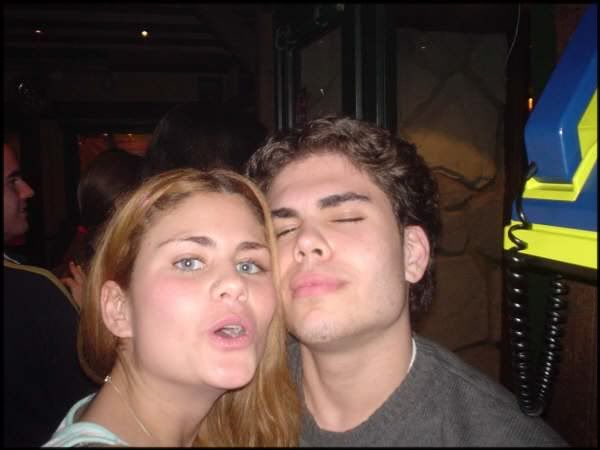
Simple enough: Rocio and I, trashed at some bar. Seville, 2004. (I feel I look older there than I do now, oddly enough.)

Bobby Fudge playing with a random water-pump on a random street in West Berlin. June 2004.
(Bobby went on to win the "Best Ass in the Congress-Bundestag Congressional Scholarship Program).
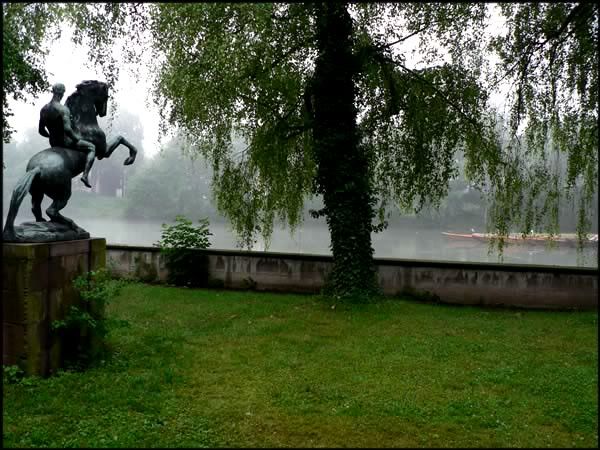
Neckar River, as seen from the rear garden of Jugenherberge Tübingen, Summer 2003.

This is just silly, but I love it.

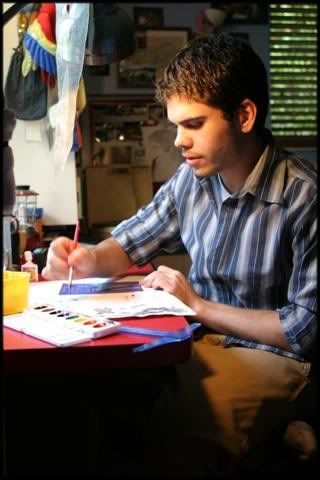
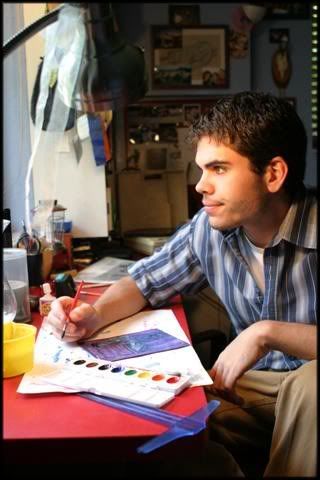
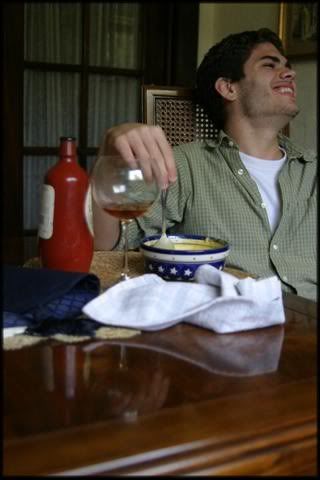
Robin pictures, September 2005.